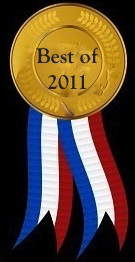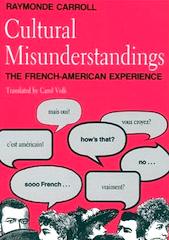Restaurant Etiquette in France
- SUBSCRIBE
- ALREADY SUBSCRIBED?
BECOME A BONJOUR PARIS MEMBER
Gain full access to our collection of over 5,000 articles and bring the City of Light into your life. Just 60 USD per year.
Find out why you should become a member here.
Sign in
Fill in your credentials below.
 Why people are baffled about where they should eat in France is understandable. But why so many readers ask how they ought to behave while dining is a mystery to me. Perhaps it’s because my mother raised me with a (now) tattered and patched 1955 edition of Emily Post’s Etiquette, which sits next to my computer. Manners were considered sacred then, and manners most certainly meant not using the fish knife to butter your bread. It may have been obsessive, but it gave all of us who suffered through our tutorials in decorum a sense of confidence and absolute rightness, if not outright righteousness.
Why people are baffled about where they should eat in France is understandable. But why so many readers ask how they ought to behave while dining is a mystery to me. Perhaps it’s because my mother raised me with a (now) tattered and patched 1955 edition of Emily Post’s Etiquette, which sits next to my computer. Manners were considered sacred then, and manners most certainly meant not using the fish knife to butter your bread. It may have been obsessive, but it gave all of us who suffered through our tutorials in decorum a sense of confidence and absolute rightness, if not outright righteousness.
I guess that’s why I’m taken by surprise when people who come to France send questions about the do’s and don’ts of “correct” dining. Are the French revered for having better table manners? Sitting up straighter in their chairs? Or what? Not changing forks and knives when eating and so on? Relax. The only people who revere the French are the French themselves. But you’ll be on their territory—and sitting right next to them—so here are some rules to keep in mind.
Make advance dinner reservations for small or upscale restaurants
Reserve a table unless you’re heading to McDonalds or a neighborhood café. If you’re running late, call or you may arrive to find you’re out of luck and someone else is sitting at your table. If you can’t honor the reservation, call and cancel as early in the day as possible. It’s only polite and most good French restaurants have a waiting list. Who knows, you may be on it next time.
Don’t cut around a line even though you may see locals do it
Do not walk into a restaurant and go to the front of the line if there are others waiting. This simply isn’t comme il faut, and more than likely, you’ll neither endear yourself to the other patrons nor receive better treatment from the Maître d’hôtel who will seat you. If you don’t like the table you’re offered, there’s a possibility you may be able to score another one, if you ask nicely, and whatever you do, do not raise your voice.
Ask, don’t assume everyone speaks English
Don’t assume people don’t speak English, most especially in Paris. Chances are they do and aren’t charmed by snarky comments, asides, or wisecracks under your breath.
Treat French waiters like professionals that they are
Waiters in good French restaurants consider themselves to be professionals and expect to be treated that way. Even though some people claim that service isn’t what it used to be, yelling, “Garçon” (boy) will get you nowhere—and, more to the point, no service.
It’s fine to ask about foreign menu items you don’t know
Don’t hesitate to ask questions about the menu rather than winging it. For example, tête de veau is not veal. Rather, it’s calf’s head and not everyone’s cup of tea. If you have special dietary needs (or allergies), call the restaurant in advance and see if it can accommodate you. I’ve never been someplace I haven’t been able to order a vegetable plate and invariably enjoyed it.
About city water, bottled water and ice in drinks
There’s a huge markup when you order bottled water. Do not feel intimidated into doing so unless it’s your choice. I’m a sucker for certain sparkling water, but when it comes to l’eau plate—the stuff that comes out of the faucet—just ask for a carafe and spend that money elsewhere. Depending on where you’re eating, ice cubes may or may not be available. In many French restaurants, you may be given two or three cubes. In restaurants that have many American clients, chances are good that you’ll be served a small bucket of ice. And it’s often a silver-plated bucket.
Wine or whine?
Again, you don’t have to drink and don’t feel guilty if you don’t. Wine consumption in France has plummeted and it’s not your responsibility to bail out the vintners. Plenty of others are happy to drink for the cause.
The French thing about elbows and hands
Do not place them on the table. It’s considered unsanitary. And keep your hands out of your lap and up where they can be seen. This dates back to old folk tales French children were told about robbers who held daggers on their laps for after dinner use.
No pictures, please
When in France, don’t take photos without asking unless you happen to be a journalist who is taking photos of the food. After all, who wants to be photographed chewing away? Pas moi, merci.
Tips
The tip is included in France. However, if the service has been above average (and you want to return to the restaurant sooner than later), you might add up to 5% if everything was perfect. Do not tip 20%. It’s not expected or necessary, and even though Americans commonly do, the French don’t. To be more realistic, the server will pocket the tip and think you’re a jerk or a show-off.
Doggie bags
The French say they don’t, which doesn’t mean they really don’t. The English phrase doggie bag is actually used in France. Tell the waiter you have a sick mother, spouse, lover et voilà, you too can have you next day’s meal packed and ready to go. Or skip the fiction and tell the server you want un sac à emporter les restes (a bag for the leftovers).
Sharing food
When I first moved to France, if someone touched another person’s plate, it was considered a cardinal sin. Thank goodness things are easing up…but don’t push your luck too far; of course, you won’t be thrown out of the restaurant if you do share. Besides, French restaurant owners don’t give portions large enough to feed a family.
Utensils and finger bowls
The French grow up eating en famille with real meals served at a table with, all things being equal and reasonably prosperous, the whole arsenal of flatware and are convinced they always use the right implement. French waiters and waitresses grow up knowing better. So they set the table with the utensils you need first farthest from the plate with the exception of the knife. Just work from the outside in.
If you’re eating in a very fancy restaurant and are presented with a bowl filled with water after a fish course or quail course, whatever you do, don’t pick up the bowl and drink it. It’s intended to rinse your fingers. Doing anything other than it will be definite proof you’re mal élevé.
I’d really like to cover cell phone dos and don’ts. But, that’s another article. The French love them as do so many others.
Any more questions about etiquette in French restaurants? Don’t be shy—fire away.
(c) Paris New Media, LLC
 This story is a 2011 Readers’ Favorite.
This story is a 2011 Readers’ Favorite.
Karen Fawcett is the publisher of BonjourParis in year 20-something of her love affair with France. If there’s another online publisher who has devoted decades to sharing information about France, we’ve yet to find them. BonjourParis readers have faithfully subscribed to read her musings about an expat’s life in France and travels on the road. To read any of her hundreds of columns, just click on her name.
Subscribe for FREE weekly newsletters with subscriber-only content.
BonjourParis has been a leading France travel and French lifestyle site since 1995.
Readers’ Favorites: Top 100 Books, imports & more at our Amazon store
Thank you for using our link to Amazon.com…we appreciate your support of our site.








